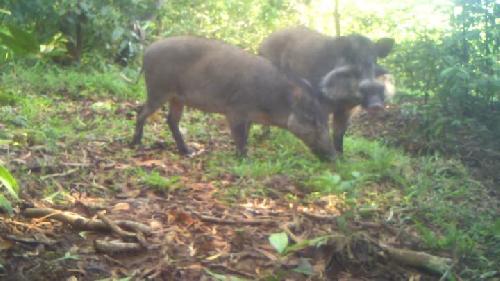The rare Bawean warty pig mostly forages at night in community-owned forests on Bawean island, and is endangered, according to a study published April 6, 2016 in the open-access journal PLOS ONE by Mark Rademaker from the VHL University of Applied Sciences, The Netherlands, and colleagues.
The Bawean warty pig is found solely on Bawean island, Indonesia. Previously, only anecdotal information existed about the Bawean warty pig's behavior and conservation needs, gathered mostly from examining museum specimens and interviews with local people. To better understand this species, the authors of this study recorded footage of wild Bawean warty pigs over three months using camera traps at over 100 locations to estimate the species' population size, as well as to assess its activity patterns and preferred habitat types.
According to the findings, the Bawean warty pig has a low population density compared to other pig species in Southeast Asia, with a total population of fewer than 250 mature individuals. This, along with its very limited range, suggests it should have at least an IUCN/SSC Red List status of Endangered. The authors also report that the pigs were mainly nocturnal and preferred to forage in community-owned forests and near forest borders, the former likely to contain energy-rich foods for the pigs, such as roots and tubers. This habitat preference makes them vulnerable to conflict with local communities.
 Female and male Bawean warty pig -- image from camera trap. Credit: Bawean Endemics Conservation Initiative, BEKI
Female and male Bawean warty pig -- image from camera trap. Credit: Bawean Endemics Conservation Initiative, BEKI
Co-author Johanna Rode-Margono notes, "While females look very similar to wild boar the male Bawean warty pigs has three pairs of enormous warts on each side of its face. Only less than 250 mature animals occur on the island of Bawean, making them one of the rarest pig species on earth."
Further research is needed, but this systematic study of the Bawean warty pig may provide valuable initial information about its ecology and conservation needs.
source: PLOS